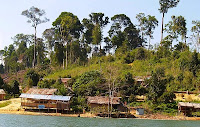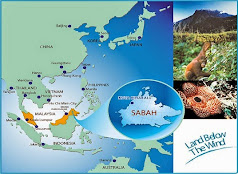
 Little known to the rest of the world, the indigenous peoples in Malaysia Peninsular Malaysia or the Orang Asli of Belum-Temenggor are still very dependent on the forest for their existence. Logging, poaching and over-harvesting have left them with very little to look forward to.
Little known to the rest of the world, the indigenous peoples in Malaysia Peninsular Malaysia or the Orang Asli of Belum-Temenggor are still very dependent on the forest for their existence. Logging, poaching and over-harvesting have left them with very little to look forward to.Logging and poachers are emptying the Belum-Temenggor forests of its wild resources, and the orang asli are suffering as the forest, which feeds them, is no longer as rich as before.
A report by the Centre for Malaysian Indigenous Studies in Universiti Malaya (UM) states that a growing number of locals and armed foreigners are encroaching into the sprawling Belum-Temenggor forest in northern Perak to hunt for animals, fish and collect gaharu (or incense wood). This is depriving the orang asli of food and livelihood.
 “Rather than acknowledging that their lifestyle of exploiting jungle produce was depleting the resources of the forest, the orang asli say it is outsiders who are causing the depletion, and that is a threat to them,” says Azrina Abdullah, one of the three authors of the report Collectors And Traders: A Study Of Orang Asli Involvement In Wildlife Trade In The Belum-Temenggor Complex.
“Rather than acknowledging that their lifestyle of exploiting jungle produce was depleting the resources of the forest, the orang asli say it is outsiders who are causing the depletion, and that is a threat to them,” says Azrina Abdullah, one of the three authors of the report Collectors And Traders: A Study Of Orang Asli Involvement In Wildlife Trade In The Belum-Temenggor Complex.- The orang asli singled out these parties as responsible for over-exploiting the forest: foreigners (Thai and Cambodian poachers, often armed), soldiers (stationed in Belum forest), Malays from surrounding villages, government officers and illegal loggers.
 The main jungle produce sold by the orang asli are gaharu, rattan, honey, rafflesia buds and medicinal plants such as tongkat ali, kacip fatimah and gajah beranak. Wildlife commonly hunted for both consumption and trade are birds, monkeys, gaurs, pangolins, barking deer, deer, soft-shelled terrapins, wild boar, fish and frogs. Alarmingly, a small number admitted to hunting endangered and totally protected rhinoceros, young elephant, bear and tiger, but these were done in the past
The main jungle produce sold by the orang asli are gaharu, rattan, honey, rafflesia buds and medicinal plants such as tongkat ali, kacip fatimah and gajah beranak. Wildlife commonly hunted for both consumption and trade are birds, monkeys, gaurs, pangolins, barking deer, deer, soft-shelled terrapins, wild boar, fish and frogs. Alarmingly, a small number admitted to hunting endangered and totally protected rhinoceros, young elephant, bear and tiger, but these were done in the past

 The majority of the orang asli – of the Jahai, Temiar and Lanoh groups – do not see their hunting and gathering practice as depleting the forest. On the other hand, they say harm comes from the outsiders. Most claim to be not involved in the sale of wild animals and do so only if they have excess. Only a handful (17 out of 284) say they have been paid by outsiders to collect forest produce, namely rattan, rafflesia buds, gaharu, honey and fish.
The majority of the orang asli – of the Jahai, Temiar and Lanoh groups – do not see their hunting and gathering practice as depleting the forest. On the other hand, they say harm comes from the outsiders. Most claim to be not involved in the sale of wild animals and do so only if they have excess. Only a handful (17 out of 284) say they have been paid by outsiders to collect forest produce, namely rattan, rafflesia buds, gaharu, honey and fish. “Most say they do not purposely hunt for trade,” says Azrina, a research fellow at the UM centre.
“Most say they do not purposely hunt for trade,” says Azrina, a research fellow at the UM centre.- There is a possibility that the orang asli are not answering survey questions truthfully but the researchers doubt that, as they themselves saw little evidence of wildlife trade in their numerous visits to the villages.
- “You don’t get the sense that there is trade going on. Unlike in Pahang, where the orang asli openly trade in wild animals and plants,” says Kamal Solhaimi Fadzil, a lecturer with the Department of Anthropology and Sociology.
 In any case, there is now little left to hunt, the orang asli told the researchers. They say the forest has been emptied over the past decade, due to logging, over-harvesting, poor enforcement and the influx of visitors. They say logging roads allow outsiders to easily reach the forest to collect gaharu and fish. Worse is when the outsiders use illegal fishing methods such as explosives.
In any case, there is now little left to hunt, the orang asli told the researchers. They say the forest has been emptied over the past decade, due to logging, over-harvesting, poor enforcement and the influx of visitors. They say logging roads allow outsiders to easily reach the forest to collect gaharu and fish. Worse is when the outsiders use illegal fishing methods such as explosives.- Another study by Mark Rayan, a senior field biologist at World Wide Fund for Nature, also points to illegal hunting activities in Belum-Temenggor. In his survey of 131 orang asli in Temenggor forest, 101 told him they have spotted hunters, 28 say they have been asked by outsiders to lead hunting trips, and 15 have received requests to trap certain animals (hill mynas, magpies, pangolins, deer, gaurs, frogs, macaque, and even tigers).

 In the Belum forests, the numbers are 51, three and 15 out of the 98 people questioned, and the “wanted” animals are turtles, frogs, deer, birds and tokek (gecko).
In the Belum forests, the numbers are 51, three and 15 out of the 98 people questioned, and the “wanted” animals are turtles, frogs, deer, birds and tokek (gecko).Azrina chips in: “We’ve gone in and out of the villages and forests many times, and we don’t see a lot of wildlife. The orang asli are getting frustrated as a lot of the things which they used to harvest are not there anymore.”
Poaching is rampant because the forest is highly accessible with the opening of logging roads in Temenggor and Grik forest reserves. To demonstrate how outsiders can enter the area, Kamal relates a story of how a Pakistani carpet seller rode his motorbike along a logging track to reach remote villages to tout his wares to the orang asli (he offers instalment payments to the poor folks).
 To add to their woeful tale of decimated forests and encroachment, the orang asli have to contend with rampaging animals displaced by logging. Their durian, rubber, fruits and oil palm trees have been trampled over or eaten up by elephants and wild boars. “One farmer in Semelor gave up planting rubber as his crops have been destroyed eight times,” reveals Or, now a project officer at Traffic, the wildlife trade monitoring body.
To add to their woeful tale of decimated forests and encroachment, the orang asli have to contend with rampaging animals displaced by logging. Their durian, rubber, fruits and oil palm trees have been trampled over or eaten up by elephants and wild boars. “One farmer in Semelor gave up planting rubber as his crops have been destroyed eight times,” reveals Or, now a project officer at Traffic, the wildlife trade monitoring body.- Past studies said that translocation of elephants displaced from Johor forests has caused a sudden spike in jumbo numbers in Belum-Temenggor, and the population has exceeded what the forest can sustain.
 Growing visitor numbers further worsen the orang asli’s plight. “No one is looking at the impact of tourism on the lake, forest and local communities, such as when facilities are built, as well as noise from boats,” says Kamal. There are also rude, gawking visitors who descend by the boatloads upon orang asli villages, uninvited. The orang asli also object to newly established four-wheel drive trails which also allow more people to reach their remote settlements.
Growing visitor numbers further worsen the orang asli’s plight. “No one is looking at the impact of tourism on the lake, forest and local communities, such as when facilities are built, as well as noise from boats,” says Kamal. There are also rude, gawking visitors who descend by the boatloads upon orang asli villages, uninvited. The orang asli also object to newly established four-wheel drive trails which also allow more people to reach their remote settlements. Under the new Wildlife Conservation Act 2010, the orang asli can only hunt 10 species for their own consumption, not for trade: wild boar, sambar deer, lesser mousedeer, pig-tailed macaque, silver leaf monkey, dusky leaf monkey, Malayan porcupine, brush-tailed porcupine, white-breasted waterhen and emerald dove. Under the old legislation, they pretty much could hunt anything except for totally protected species (which includes endangered species such as the tiger, elephant and rhinoceros).
Under the new Wildlife Conservation Act 2010, the orang asli can only hunt 10 species for their own consumption, not for trade: wild boar, sambar deer, lesser mousedeer, pig-tailed macaque, silver leaf monkey, dusky leaf monkey, Malayan porcupine, brush-tailed porcupine, white-breasted waterhen and emerald dove. Under the old legislation, they pretty much could hunt anything except for totally protected species (which includes endangered species such as the tiger, elephant and rhinoceros).- The researchers fear that the curtailment could lead to more poaching as it fails to address underlying issues, namely those who hunt for sustenance. As it is, they see malnourished children running around in the orang asli villages.
- Would compensation from the Government be enough to discourage the orang asli from hunting? The majority say no; unable to afford food purchases, they have to forage in the jungle.
- Furthermore, hunting is their main source of income and their traditional right, one that is provided for by the law. They also argue that it is the Government’s responsibility to provide for them regardless of whether or not they hunt. Only a handful agree to stop hunting if compensated with cash and daily necessities such as rice, sugar, salt and milk.

To resolve the issue of wildlife trade, the underlying reasons that push the orang asli to hunt and sell forest product need attention, that is, lack of marketable skills, isolation from urban areas and poverty. They say hunting is necessary for their survival, and selling wildlife supplements their income.
- Indeed, trapping wildlife for sale is appealing when you earn less than RM200 a month, have a family to feed, yet the forest no longer provides, and the prices offered by middlemen are lucrative: a rafflesia bud or bloom can sell for RM2.50 to RM21; a soft-shelled terrapin from RM5 to RM200; a bird from RM50 to RM300; a pangolin from RM500 to RM1,000; a wild boar for RM100 each; and a deer for RM70.
 The orang asli were relocated to their present settlements some 30 years ago to make way for the construction of the Temenggor Dam. Promises by the Government of development and a higher standard of living have remained unfulfilled until today, according to Azrina.
The orang asli were relocated to their present settlements some 30 years ago to make way for the construction of the Temenggor Dam. Promises by the Government of development and a higher standard of living have remained unfulfilled until today, according to Azrina.- “Most of the families earn RM100 a month and live in poverty. Most villages don’t have piped water and electricity, which is ironic as 1km away is the hydroelectric dam.”
- Village leaders told Or that they have no rights to the land. “They say the land still does not belong to them, and they are just squatting. Also, logging is closing in on the villages and polluting their water sources.”
- Although Belum-Temenggor gets a fair share of tourists, the orang asli benefits little from it. They have been left out of the expanding tourism industry; their only involvement is when groups visit their villages.
 Currently, the orang asli are helpless should they see poachers. A project is in the works, however, that will entrust orang asli who are Rela members, with the authority to stop encroachers. This might require them to screen visitors at checkpoints, for entry permits into the area.
Currently, the orang asli are helpless should they see poachers. A project is in the works, however, that will entrust orang asli who are Rela members, with the authority to stop encroachers. This might require them to screen visitors at checkpoints, for entry permits into the area.


















Post a Comment